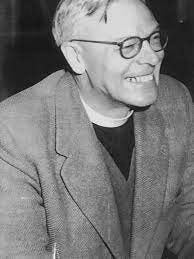
I have been thinking lately of Alan Ecclestone's pioneering 'Church Meetings' in his Darnall parish and the business of vertical and horizontal relationships in church life. The Revd Alan Ecclestone (1904-1992) wanted the local church to discover what exploratory meetings and conversations might look like (and give birth to) when not dominated by the clergy. His Parish Meetings are described by Tim Gorringe in his biography Alan Ecclestone: Priest as Revolutionary.
Church events and meetings do tend to be dominated by clergy - though 'dominate' may suggest too strong an element of wilful control. It is they who usually call them; they who usually define the agenda; they who usually open and close the event by invocation and benediction. The laity tends to comply with these patterns, indeed, to expect them.
(follow 'Read More')
Church events and meetings do tend to be dominated by clergy - though 'dominate' may suggest too strong an element of wilful control. It is they who usually call them; they who usually define the agenda; they who usually open and close the event by invocation and benediction. The laity tends to comply with these patterns, indeed, to expect them.
(follow 'Read More')
The Revd Alan Ecclestone (1904-1992) wanted the local church to discover what exploratory meetings and conversations might look like (and give birth to) when not dominated by the clergy. His Parish Meetings are described by Tim Gorringe in his biography Alan Ecclestone: Priest as Revolutionary. Church events and meetings do tend to be dominated by clergy - though 'dominate' may suggest too strong an element of wilful control. It is they who usually call them; they who usually define the agenda; they who usually open and close the event by invocation and benediction. The laity tend to comply with these patterns, indeed, to expect them.
This model seems a poor one, and to my thinking is infantilising. It is common elsewhere in hierarchical structures. Modern corporate events are often over-managed, with speakers (keynote ones, no less) and controlled questions. There is no real conversation - which is always horizontal in nature. At such events communication tends only to the vertical. I have witnessed some cathedral discussion events where people in the 'audience' are invited to write out a question and hand it to a frock-coated flunky who conveys it to someone who then decides whether or not it is to be asked. And not asked by the questioner, but by a measured intermediary. The practical need to best manage large events cannot be disputed, but when does this verge into control, even repression? These are not conversations between adults, seeking to better understand something (discernment). They are staged events.
Alan Ecclestone thought it vitally important that the church (the gathered body of Christ's followers) should meet outside the liturgy and that its members should be enabled to speak and be listened to. He realised this might take time, as people found their voices and also learned to truly listen to one another. It is worth the effort. This is being the local Church. Local and at once universal.
This model seems a poor one, and to my thinking is infantilising. It is common elsewhere in hierarchical structures. Modern corporate events are often over-managed, with speakers (keynote ones, no less) and controlled questions. There is no real conversation - which is always horizontal in nature. At such events communication tends only to the vertical. I have witnessed some cathedral discussion events where people in the 'audience' are invited to write out a question and hand it to a frock-coated flunky who conveys it to someone who then decides whether or not it is to be asked. And not asked by the questioner, but by a measured intermediary. The practical need to best manage large events cannot be disputed, but when does this verge into control, even repression? These are not conversations between adults, seeking to better understand something (discernment). They are staged events.
Alan Ecclestone thought it vitally important that the church (the gathered body of Christ's followers) should meet outside the liturgy and that its members should be enabled to speak and be listened to. He realised this might take time, as people found their voices and also learned to truly listen to one another. It is worth the effort. This is being the local Church. Local and at once universal.